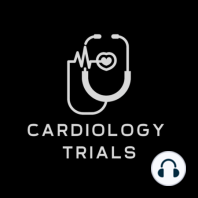37 min listen
Review of the TRITON-TIMI 38 Trial
ratings:
Length:
15 minutes
Released:
Apr 2, 2024
Format:
Podcast episode
Description
Note to readers: Since going live with Cardiology Trials Substack in January of 2024 we have been exclusively covering trials that we have categorized as belonging to the major subject heading “Acute Coronary Syndrome” belonging to the subsection “Medicines”. Our indexing scheme was described in one of our original posts and we encourage our audience to read it if you have not already. This is pertinent because the next several trials being presented may seem to come out of the blue but we assure you there is a method.N Engl J Med 2007;357:2011-15.Background Up to now we have presented trials involving major foundational medical therapies for acute coronary syndrome which include aspirin, thrombolytic agents and anticoagulation, but not those involving percutaneous coronary intervention (PCI) as they are reserved for another section. But, by the turn of the 21st century, PCI had become the dominant up-front strategy for revascularization in many countries around the world. Clinical trials demonstrated it improved outcomes, the main one being re-infarction, compared to thrombolysis in patients with STEMIs, and there was an evolving evidence for it in non-ST-segment elevation acute coronary syndrome (STEACS) as well, where thrombolysis had not demonstrated any significant benefits.As PCI became dominant, antithrombotic strategies for optimizing outcomes following PCI evolved along with it. These early trials generally involved a mixture of patient phenotypes (acute vs elective PCI) and were relatively small and of limited quality by comparison to many of the seminal trials presented thus far. Instead of presenting each of these smaller studies, we direct readers to a narrative review that nicely describes the evolution of dual-antiplatelet therapy for PCI and other indications.Briefly: dual-antiplatelet therapy with aspirin and ticlopidine, an antiplatelet agent belonging to the drug class of thienopyridines, which inhibits platelet aggregation induced by ADP, was found superior to aspirin alone or aspirin plus anticoagulation when PCI was performed; however, there were concerns about its safety. Clopidogrel was developed after ticlopidine; it had a similar mechanism of action but less safety concerns and could be given as a loading dose to produce more rapid effects. Despite limited evidence from clinical trials comparing it head-to-head with ticlopidine it became the dominant thienopyridine agent on the market and still has a prominent role in the management of cardiovascular diseases today.Following PCI and dual-antiplatelet therapy with aspirin and clopidogrel, patients continue to have an elevated risk of coronary events, in general, and in-stent related coronary events, in particular. Some of this risk has been attributed to limitations of clopidogrel itself. Clopidogrel has modest antiplatelet effects (compared to other thienopyridines) with substantial interpatient variability due to genetic polymorphisms that impact clopidogrel metabolism and antiplatelet efficacy. Clopidogrel also has a delayed onset of action, which is especially relevant regarding its ability to protect against the dreaded adverse event of early in-stent thrombosis.Prasugrel is a thienopyridine—developed after clopidogrel—that inhibits platelet aggregation more rapidly, consistently and to a greater extent. The Therapeutic Outcomes by Optimizing Platelet Inhibition with Prasugrel–Thrombolysis in Myocardial Infarction (TRITON–TIMI) 38 trial sought to test the hypothesis that prasugrel would reduce major cardiovascular events compared to clopidogrel in patients with acute coronary syndrome undergoing PCI.Cardiology Trial’s Substack is a reader-supported publication. To receive new posts and support our work, consider becoming a free or paid subscriber.Patients Eligible patients had either moderate-to-high risk unstable angina (UA) or NSTEMI or STEMI. UA and NSTEMI were defined by ischemic symptoms lasting 10 minutes or more and occurring within 72 hour
Released:
Apr 2, 2024
Format:
Podcast episode
Titles in the series (40)
Summary and discussion of CAST and ISIS-3 by Cardiology Trials
